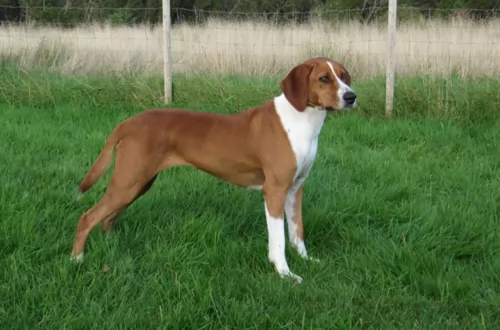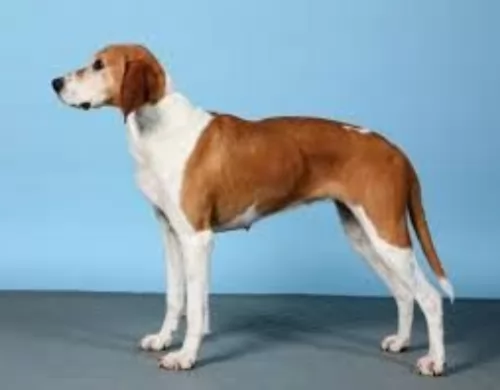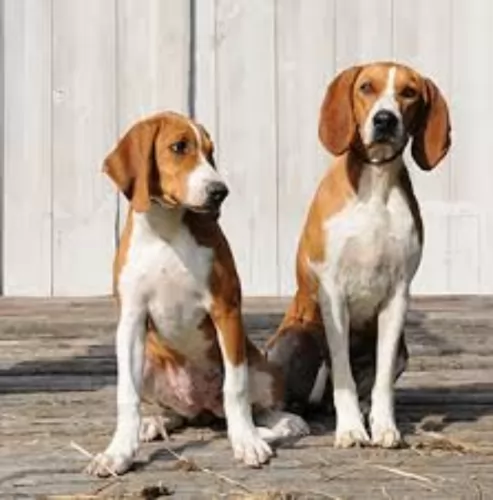 Hygenhund is originated from Norway but Yochon is originated from United States. Hygenhund may grow 33 cm / 13 inches higher than Yochon. Hygenhund may weigh 16 kg / 36 pounds more than Yochon. Both Hygenhund and Yochon has almost same life span. Both Hygenhund and Yochon has same litter size. Both Hygenhund and Yochon requires Moderate Maintenance.
Hygenhund is originated from Norway but Yochon is originated from United States. Hygenhund may grow 33 cm / 13 inches higher than Yochon. Hygenhund may weigh 16 kg / 36 pounds more than Yochon. Both Hygenhund and Yochon has almost same life span. Both Hygenhund and Yochon has same litter size. Both Hygenhund and Yochon requires Moderate Maintenance.
Basic Information
undefined
Norway
United States
Life Span:
10 - 15 Years
10 - 14 Years
Other Names:
Hygen Hound, Hygen Dog
Bichyorkie • Borkie • Yo-Chon • Yochon • Yorki-Chon • Yorkichon • Yorkiechon • Yorkie-Chon • Yorkie-Bichon • Yorkshire Frise
Colors Available:
sometimes combined with white markings. , chestnut (with or without black shading) and black with bright chestnut colors, yellow and red
Black, Blonde, Brown, Cream, Dark, Brown, Golden, Gray, White
Coat:
thick, shiny
silky or curly very full coat
Temperament:
Alert, Energetic, Independent, Intelligent, Loving, Loyal, Playful, Protective
Alert, Energetic, Friendly, Independent, Intelligent, Loving, Playful
Grooming:
Moderate Maintenance
Moderate Maintenance
Trainability:
Moderate
Moderate
New Owners Friendly:
Yes
Yes
History
 The Hygenhund is a hound from Norway that was developed in the early 1800’s by the Norwegian breeder Hygen. It was developed for hunting small game such as fox, rabbit, hare or racoon. It is known for its endurance and ability to survive travel across vast artic land without fatigue. It was developed by crossing several Norwegian hounds with ones from England and Germany. This includes basset hounds, holsteiner hounds, beagles, Bloodhounds, Scandinavian hounds and English Pointers. The resulting Hygehound is a scent hound whose popularity fell in the 20th century. Most of the remaining dogs today are located in Norway. The Norwegian Kennel Club and the UKC have both recognized the breed yet its numbers remain low. Even at that the breed today remains a great hunting dog but it is also a great companion or family dog.
The Hygenhund is a hound from Norway that was developed in the early 1800’s by the Norwegian breeder Hygen. It was developed for hunting small game such as fox, rabbit, hare or racoon. It is known for its endurance and ability to survive travel across vast artic land without fatigue. It was developed by crossing several Norwegian hounds with ones from England and Germany. This includes basset hounds, holsteiner hounds, beagles, Bloodhounds, Scandinavian hounds and English Pointers. The resulting Hygehound is a scent hound whose popularity fell in the 20th century. Most of the remaining dogs today are located in Norway. The Norwegian Kennel Club and the UKC have both recognized the breed yet its numbers remain low. Even at that the breed today remains a great hunting dog but it is also a great companion or family dog.
The Yochon is a “designer dog” – a cross between the Yorkshire Terrier and the Bichon Frise. They are not a purebred and are not recognized by purebred dog clubs such as the American Kennel Club (AKC). They are small, playful, families dogs. Most of them bear the best characteristics of each of their founding breeds, but because they are crossbreeds and most will be multi-generational cross breeds, there are no two dogs alike.
Though not recognized by the traditional purebred clubs they are recognized by several hybrid canine clubs. The cross was developed in the United States.
Description
Description
 The Hygenhund has a solid rectangular and compact body with muscular and compact legs and paws. Their heads are shaped like a triangle with dark eyes and a broad skull. The muzzle and neck are long and the topline is even. They carry their tail high, but they do not curl it over their back. They are a medium sized dog with short hair. They have an overabundance of energy and get bored easily. They can come in black with chestnut or white markings, yellow and red, chestnut without or with black markings.
The Hygenhund has a solid rectangular and compact body with muscular and compact legs and paws. Their heads are shaped like a triangle with dark eyes and a broad skull. The muzzle and neck are long and the topline is even. They carry their tail high, but they do not curl it over their back. They are a medium sized dog with short hair. They have an overabundance of energy and get bored easily. They can come in black with chestnut or white markings, yellow and red, chestnut without or with black markings.
Yochons go by many different names but in general they are toy dogs, weighing in at under 20 pounds, most weighing 6-12 pounds. They have black noses, long tails, and round eyes. Their muzzles are blunt and their skulls are also round.
They have fluffy, full coats that can range from tan, to brown to black. They can also be white or cream. Their ears can be either hanging or erect.
Characteristics
 1. Children friendliness – The Hygenhund is very friendly to children and love to play with them.
1. Children friendliness – The Hygenhund is very friendly to children and love to play with them.
Special talents
Stamina, intelligence and ability to endure cold climates.
Adaptability
Very adaptable in some ways – enduring cold climates for instance. However, they need a large yard or area to run in. They are not as adaptable in an apartment.
Learning ability
The Hygenhund is very intelligent and a quick learner. They love learning new things.
1 Children friendliness -yes very good but watch careful that children do not hurt them as they are so small and fragile.
2.Special talents – Loves families and playing
3.Adaptability – adapts well to apartments can play indoors
4.Learning ability – intelligent and independent
Health Problems
The Hygenhund is prone to a variety of health problems including:
- Kidney Stones/Chronic Kidney Infections
- Food Allergies
- Arthritis – can cause lameness
- Bloat – can be fatal if not treated
- Von Willebrands Disease
- Anesthesia sensitivity
- Hip Dysplasia – can result in lameness or arthritis
Both founding breeds are vulnerable to a few medical conditions. These include:
• Legg-Calve-Perthes Disease – insufficient blood to hind legs, thigh bones causing lameness.
• Patellar Luxation – slipped kneecaps can also cause lameness.
• Dental Issues – keep teeth brushed and cleaned.
• Hypothyroidism – can be treated with medication.
• Reverse Sneezing
• Allergies
• Collapsed Trachea due to small size – be careful with them at all times.
Caring The Pet
Feeding the puppy
 Since the Hygenhund is such a high energy working dog feed a high quality food. Feed 3-4 times a day for a total of 2.3 cups.
Since the Hygenhund is such a high energy working dog feed a high quality food. Feed 3-4 times a day for a total of 2.3 cups.
Feeding the adult
Again this is a high energy dog. Feed a high protein good quality dog food twice a day for a total of 3-4 cups.
Points for Good Health
Good speed and stamina. Good in cold climates.
Games and Exercises
The Hygenhund needs plenty of exercise to dissipate all its working energy. They will excel at field trials, lure coursing, fly ball, tracking, and agility.
3.Feeding the puppy – do not overfeed. Use a high quality puppy toy breed kibble. Feed 3-4 X day.
2.Feeding the adult – do not overfeed. Use a high quality adult toy breed kibble. Feed at least twice a day.
3.Points for Good Health hearty/general good health and stamina
4. Games and Exercises does not need a lot of exercise . They enjoy obedience and agility trials.
Comparison with other breeds
- Hygenhund vs English Bulldog - Breed Comparison
- Hygenhund vs German Shepherd - Breed Comparison
- Hygenhund vs Golden Retriever - Breed Comparison
- Hygenhund vs Labrador Retriever - Breed Comparison
- Hygenhund vs West Highland White Terrier - Breed Comparison
- Hygenhund vs French Bulldog - Breed Comparison
- Hygenhund vs Beagle - Breed Comparison
- Hygenhund vs Yorkshire Terrier - Breed Comparison
- Hygenhund vs Poodle - Breed Comparison
- Hygenhund vs Rottweiler - Breed Comparison
- Hygenhund vs Boxer - Breed Comparison
- Hygenhund vs English Pointer - Breed Comparison
- Hygenhund vs Siberian Husky - Breed Comparison
- Hygenhund vs Doberman Pinscher - Breed Comparison
- Hygenhund vs American Bully - Breed Comparison
- Hygenhund vs Abruzzenhund - Breed Comparison
- Hygenhund vs Affenpinscher - Breed Comparison
- Hygenhund vs Afghan Hound - Breed Comparison
- Hygenhund vs Aidi - Breed Comparison
- Hygenhund vs Airedale Terrier - Breed Comparison
- Hygenhund vs Akbash Dog - Breed Comparison
- Hygenhund vs Akita - Breed Comparison
- Hygenhund vs Africanis - Breed Comparison
- Hygenhund vs Askal - Breed Comparison
- Hygenhund vs Atlas Terrier - Breed Comparison
- Yochon vs English Bulldog - Breed Comparison
- Yochon vs German Shepherd - Breed Comparison
- Yochon vs Golden Retriever - Breed Comparison
- Yochon vs Labrador Retriever - Breed Comparison
- Yochon vs West Highland White Terrier - Breed Comparison
- Yochon vs French Bulldog - Breed Comparison
- Yochon vs Beagle - Breed Comparison
- Yochon vs Yorkshire Terrier - Breed Comparison
- Yochon vs Poodle - Breed Comparison
- Yochon vs Rottweiler - Breed Comparison
- Yochon vs Boxer - Breed Comparison
- Yochon vs English Pointer - Breed Comparison
- Yochon vs Siberian Husky - Breed Comparison
- Yochon vs Doberman Pinscher - Breed Comparison
- Yochon vs American Bully - Breed Comparison
- Yochon vs Abruzzenhund - Breed Comparison
- Yochon vs Affenpinscher - Breed Comparison
- Yochon vs Afghan Hound - Breed Comparison
- Yochon vs Aidi - Breed Comparison
- Yochon vs Airedale Terrier - Breed Comparison
- Yochon vs Akbash Dog - Breed Comparison
- Yochon vs Akita - Breed Comparison
- Yochon vs Africanis - Breed Comparison
- Yochon vs Askal - Breed Comparison
- Yochon vs Atlas Terrier - Breed Comparison
 Petzlover
Petzlover Hygenhund is originated from Norway but Yochon is originated from United States. Hygenhund may grow 33 cm / 13 inches higher than Yochon. Hygenhund may weigh 16 kg / 36 pounds more than Yochon. Both Hygenhund and Yochon has almost same life span. Both Hygenhund and Yochon has same litter size. Both Hygenhund and Yochon requires Moderate Maintenance.
Hygenhund is originated from Norway but Yochon is originated from United States. Hygenhund may grow 33 cm / 13 inches higher than Yochon. Hygenhund may weigh 16 kg / 36 pounds more than Yochon. Both Hygenhund and Yochon has almost same life span. Both Hygenhund and Yochon has same litter size. Both Hygenhund and Yochon requires Moderate Maintenance.  The Hygenhund is a hound from Norway that was developed in the early 1800’s by the Norwegian breeder Hygen. It was developed for hunting small game such as fox, rabbit, hare or racoon. It is known for its endurance and ability to survive travel across vast artic land without fatigue. It was developed by crossing several Norwegian hounds with ones from England and Germany. This includes basset hounds, holsteiner hounds, beagles, Bloodhounds, Scandinavian hounds and English Pointers. The resulting Hygehound is a scent hound whose popularity fell in the 20th century. Most of the remaining dogs today are located in Norway. The Norwegian Kennel Club and the UKC have both recognized the breed yet its numbers remain low. Even at that the breed today remains a great hunting dog but it is also a great companion or family dog.
The Hygenhund is a hound from Norway that was developed in the early 1800’s by the Norwegian breeder Hygen. It was developed for hunting small game such as fox, rabbit, hare or racoon. It is known for its endurance and ability to survive travel across vast artic land without fatigue. It was developed by crossing several Norwegian hounds with ones from England and Germany. This includes basset hounds, holsteiner hounds, beagles, Bloodhounds, Scandinavian hounds and English Pointers. The resulting Hygehound is a scent hound whose popularity fell in the 20th century. Most of the remaining dogs today are located in Norway. The Norwegian Kennel Club and the UKC have both recognized the breed yet its numbers remain low. Even at that the breed today remains a great hunting dog but it is also a great companion or family dog. The Hygenhund has a solid rectangular and compact body with muscular and compact legs and paws. Their heads are shaped like a triangle with dark eyes and a broad skull. The muzzle and neck are long and the topline is even. They carry their tail high, but they do not curl it over their back. They are a medium sized dog with short hair. They have an overabundance of energy and get bored easily. They can come in black with chestnut or white markings, yellow and red, chestnut without or with black markings.
The Hygenhund has a solid rectangular and compact body with muscular and compact legs and paws. Their heads are shaped like a triangle with dark eyes and a broad skull. The muzzle and neck are long and the topline is even. They carry their tail high, but they do not curl it over their back. They are a medium sized dog with short hair. They have an overabundance of energy and get bored easily. They can come in black with chestnut or white markings, yellow and red, chestnut without or with black markings. 1. Children friendliness – The Hygenhund is very friendly to children and love to play with them.
1. Children friendliness – The Hygenhund is very friendly to children and love to play with them. Since the Hygenhund is such a high energy working dog feed a high quality food. Feed 3-4 times a day for a total of 2.3 cups.
Since the Hygenhund is such a high energy working dog feed a high quality food. Feed 3-4 times a day for a total of 2.3 cups.